My trip to Europe during the volcanic ash cloud mess (2010)
Tuesday, April 13th
I arrived early in the morning and was picked up at the Madrid airport by my host, Michael Santorum. He took me to the hotel in downtown Madrid and I got some sleep. In the afternoon I went to the Prado. This is the second greatest art museum in the world, after the Louvre. I looked at hundreds of paintings from the 15th and 16th centuries. Here is what I learned:
1. They adulated literacy. Books showed up in half the paintings, and always as something being read by a holy person. This association of literacy with holiness took me by surprise -- and I consider it to be of great importance. Other civilizations regarded literacy as useful or even valuable, but did not revere literacy the way that these Europeans did.
2. Nobody smiles. It really is striking how deadly serious all the expressions are. Even the baby Jesus -- of which I saw scores -- seldom smiled. Why did they think that a little baby would be so self-consciously grave? Why did their religious feelings require the banishment of gaiety? Joy was always presented as sinfulness and licentiousness. Jeez, what a bunch of grumps!
3. Whenever the Virgin Mary looks down at baby Jesus on her lap -- again, there were scores of such paintings -- she twists her neck around in a most uncomfortable manner, sticking her chin out sideways and trying to keep it elevated. Why can’t she just look straight down at the kid? Is there something unholy about a lowered chin?
All three of these elements appear in this painting:
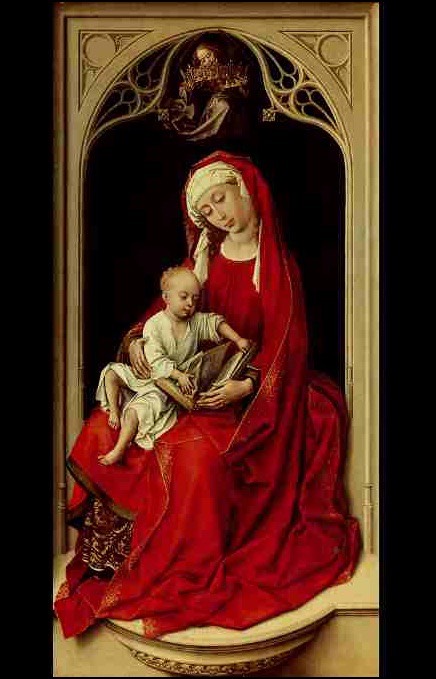
Neck-cricked Madonna with overserious baby Jesus studying a book
4. These painters put a LOT of thought into their work. The paintings are packed with symbolism, multiple scenes involving the same people, carefully laid out lighting, and so forth. I recall one image of Charon ferrying a soul across the Styx, in which the soul is shown looking to the right, while a tiny angel on the left bank is pointing towards the left. This is supposed to indicate that the soul in question is ignoring the angel’s importunations to tread the path of righteousness. If so, those importunations aren’t very eye-catching.
5. I saw a bunch of paintings by Heironymus Bosch. I love this guy’s work -- it’s so weird and fantastic. Everybody else is painting the same old images over and over again, and here’s old Heironymus with these crazy images of people being eaten by birds and wearing pots on their heads and surrounded by strange, impossible animals. I spent a lot of time looking at his great classic on the garden of earthly delights -- a triptych with the left panel showing heaven -- really boring -- the main panel showing earthly life, and the right panel showing hell -- very imaginative. This guy had quite an imagination. One wonders if he used some sort of psychedelic drugs.
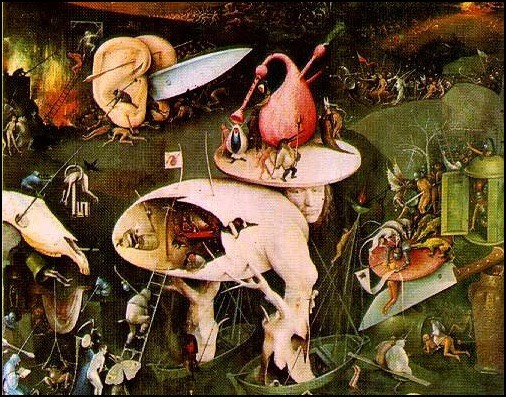
Bosch depiction of hell
6. The standardization of motifs is truly crushing. They just had to paint the same damn things over and over and over. There just wasn’t much variation. I was especially irked by the way they presented St. Jerome: always a bald guy with a big scraggly beard, bony fingers, and this odd round-headed lion. Apparently these people had no idea of what a real lion looks like, so they just kept copying the same incorrect image over and over.
Wednesday, April 14th
I delivered my lecture. I didn’t do as good a job as I could have – for some reason I was feeling off. I screwed up several slides and forgot a few lines. Worse, my presentation was uninspired. I felt more tired than enthusiastic. Perhaps it’s the jet lag. Still, I somehow managed to put a little life into it:
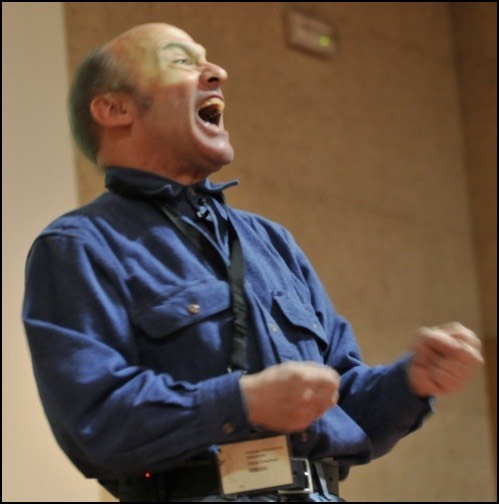
Walking through Madrid, I notice several things about the people. The young women like to wear microskirts that extend just below their crotches; underneath the microskirts they wear heavy stockings. Boots complete the attire. All in all, it’s both risque and attractive. I notice many young women walking arm in arm. I doubt that it’s an expression of lesbianism.
A lot of Spaniards smoke. After dinner several were rude enough to begin smoking; I should have left then and there. But I was locked in the seating and would have needed at least three people to move for me to depart. So I stayed. I asked my interlocutors how many friends they knew who had died of lung cancer; the could cite none. I pointed out that four of my friends had died of lung cancer, and went on to say that many Americans know people who have died of lung cancer. Americans have been smoking longer than Spaniards. The Spaniards will catch up some day. They were duly shocked.
My host Michael Santorum has been extremely solicitous of my well-being; he picked me up at the airport and will be taking me back to the airport tomorrow morning. I suggested that a taxi would be more appropriate but he insisted. I am deeply gratified by his generosity.
Ash Thursday
The day started well enough. Michael Santorum took me to the airport, everything went smoothly, and some hours later I found myself at Malpensa Airport near Milan, Italy, awaiting my connecting flight to Heathrow Airport. I waited patiently and, about an hour before the flight, noticed that it had been canceled. I went to the information counter and they told me to collect my baggage, then re-book my flight.
This turned out to be not so easy. My baggage did not show up at the appointed baggage belt, so I went to the lost luggage desk. They took my baggage receipt, checked the computer, and assured me that it would show up in five minutes. Fifteen minutes later I went back and the new lady at lost luggage said that it was probably stuck in the belt system and it would show up in another five minutes. It didn’t show up. So now she searched and said that the computer could not locate my baggage, but she would begin a direct search. Fifteen minutes later a fellow walked up with my bag.
So, after I got my luggage I went looking for the ticket counter so that I could rebook another flight. Because I had been so delayed looking for my luggage, I was far behind the crowd and the agent told me that the earliest she could rebook me was Tuesday -- five days hence! That’s when I learned about the volcanic eruption in Iceland whose ash cloud had shut down all flights into England. I realized that I was in deep doo-doo.
Since my iPhone refused to function in any manner, I had to find a pay phone. After some searching I found one that would accept credit cards and, after much screwing around, managed to get it working. I called Kathy at home -- at 6:30 AM her time. She grasped the situation pretty quickly and sprang to work. After about 90 minutes of work, she established that there was nothing she could do. All flights were cancelled. The Eurail website crashed under the load of people trying to find trains, so she couldn’t get any train tickets for me. And there were no hotel rooms available in Milan: none, nada, zero. I would have to get to the train station in Milan and get out of Milan myself.
So I found my way to the train platform at Malpensa Airport. The guy at the train ticket counter took my eleven euros and told me to take the train on platform 1 in 30 minutes. Five minutes later a train rolled into platform 1 and stopped. But it wasn’t going to the main train station, despite what the ticket guy had told me. I was scratching my head trying to figure out what to do when I overheard two other fellows discussing the same dilemma in English. We decided that this was in fact the correct train so we boarded it. Five minutes later I saw them rushing off the train so I grabbed my luggage and jumped off too. Apparently this train did not, in fact, go to the main train station. After a while they hooked up with an Italian chap who figured out that, although this train did not go to the main train station, it stopped at a subway station close to the main train station. So we rushed back on board. Five minutes later, the train left.
I now had three companions: our Italian guide, a Nigerian, and a Pakistani. When we reached the subway station, we debarked and got tickets for the subway. They were one euro each, but nobody had any change. I found a five-euro note that we used for all of us. Then we went to the wrong platform. Then we went to the right platform. We got on the train, went a few stops, changed trains, then went another few stops, and we were at the main train station. The Italian and the Nigerian went their own way. That left just me and Khalid, the Pakistani. Khalid had been born in Pakistan but moved to England when he was ten years old, so he was really quite English. We navigated the subterranean labyrinth of tunnels and then found the main train station, then found the ticket counter.
There were several hundred people in line at the ticket counter; we had all been stranded by the air situation. We learned more about the situation while waiting in line. The Paris train workers had done their part by going on strike -- how very French of them. There were no trains to Paris. The Italian ticket agents were as unhelpful as they could legally be. If you asked any question other than "Can I get a seat on a train to (destination)?", they shook their heads and gave no answer. If you asked your question in the correct format, they would answer with "The earliest I can get you a seat will be next Tuesday." When we reached the counter, we inquired about trains to Paris, Munich, and Brussels, and got the expected answer. Hell, we had to ask -- after waiting in line for an hour, we wanted to make the most of our 60 seconds of actual information. But then I had another idea: were there any trains to Basel? That sunk him. He grudgingly admitted that there was a train at 7:30 the next morning. We pounced on the tickets at a mere 75 euros each and congratulated ourselves on our cleverness and good fortune. The reasons we got those seats were a) nobody else knew to ask about Basel; and b) the ticket agents certainly weren’t going to suggest it to anybody.
Next we sought a pay phone so that I could inform Kathy. This being an Italian train station, there were no pay phones. Khalid offered the use of his cell phone but the battery was dead. We left the train station looking for a pay phone but found nothing. There was an Internet cafe, so I logged on there and sent an emergency email to everybody I could think of: please call Kathy and advise her of my situation. The indirect route was necessary because Kathy never checks her email. It was also a nice dramatic stroke to impress my friends.
Afterwards, we went next door to McDonald’s, where Khalid bought dinner. We lingered there for several hours; we noticed plenty of other people with luggage, stranded and roomless like ourselves. Khalid and I talked about all manner of random topics, with the ready camraderie of fellow victims of a disaster. The desperateness of our situation shattered our inhibitions, and we freely discussed religion, tolerance, injustice, and other topics, finding that we shared similar outlooks.
Khalid was trained as a chemical engineer and worked for a company producing equipment for oil refineries. He came to Milan for a quick airport meeting to vet a new vendor of pressure vessel headers. He hopped into a plane in London in the morning, had his meeting at Malpensa for lunch -- and then discovered himself stranded without any personal effects or any change of clothes. He didn’t even bring any euros with him -- he hadn’t expected to need any.
After McDonald’s we went back to the Internet cafe to research more train schedules. We found an excellent connection from Basel to Brussels; we tried to purchase the tickets but the website required us to pick them up at any train station in Belgium. Why must a train ticket from Basel to Brussels be picked up in Belgium? I suspect that it is because the Belgians are half French.
We also established that there was only one train from Brussels to London on the night of our arrival -- and it was sold out. We’d have to spend Friday night in Brussels and take a Saturday train to London. I dispatched an email to Kathy asking her to find us a hotel room near the train station in Brussels.
So we went back to the train station and scouted a place to bed down for the night. I was hoping to find an electrical outlet so that I could recharge some of my battery-powered devices, but had no luck. We found a cozy little alcove at the front of a closed shop and settled down. I lent Khalid a poncho for a ground blanket and a heavy shirt for a pillow. I laid out some of my clothes on the cold floor, threw a few other things to cover me, replaced my heavy boots with slippers, and tried to sleep. It wasn’t easy but I dozed on and off -- until I saw a pair of feet and somebody picked up my laptop! I went from half-asleep to combat status in two seconds, threw off the covers, and leapt to my feet, chasing after the thief, who was only about 15 feet away. I shouted "Hey!"; he turned to face me, and it was apparent that he didn’t want a fight. He started to hand me the laptop but at that point my slippers did what slippers do: they slipped. I fell flat on my back on the hard floor. He and his two partners in crime laughed good-naturedly and he dropped the laptop onto my lap with a jocular Italian comment. Still somewhat disoriented, I returned to my lair. I put my laptop close to my pillow and laid on my back with my hat covering my face. Fifteen minutes later, ANOTHER thief stepped into our alcove and tried to find something to filch, but I whipped off my hat and glared at him, forcing him to retreat.
Now I was so worried and upset that I couldn’t sleep. I tried, but the best I could do was to doze off, only to suddenly jerk awake at any slight noise. Around 3:00 AM I drifted awake with the realization that I desperately needed to empty my bladder -- a symptom of aging and a stiffening bladder. But how was I to leave my possessions if they were only to be stolen? So I carefully packed everything up, put my boots back on, woke Khalid and asked him to keep an eye on my main luggage, and set out carrying my laptop and backpack. I wandered all around the train station; there were hundreds of people everywhere, trying to sleep anywhere they could. There were no toilets to be found, and the doors were locked -- I couldn’t even go outside to find a tree. I was growing desperate when my nose led me to the same place where others in the same situation had solved their problem. It was truly disgusting to urinate in a dark corner of the train station, but it was the only place available. Screw the damn Italians -- if they’re going to lock us into a place with no toilets, they deserve to have their train station peed upon.
I found my way back to our little alcove, re-arranged my bedding, and went back to sleep -- only to be rousted at 4:15 AM by the Italian police, who considered it intolerable that hundreds of stranded travelers unable to rent hotel rooms would have the bad manners to actually try to sleep on the floor. So we all stood around, trying to stay warm, until 6:30 when the first restaurant opened, which we all jammed into. It was so good to have a hot chocolate and something to eat.
I want to insert some additional nasty comments about the Italians. Khalid and I were able to cope with the situation -- hey, we’re tough guys -- but there were old people, mothers with small children, even some babies in that train station. It was cold and miserable. There were no drinking fountains and no bathrooms. The Italian thieves had no problem responding to the situation quickly, but the Italian authorities were completely inert, and offered no assistance to the stranded travelers. For me, it wasn’t so bad, but I am outraged that weaker people were not cared for.
Friday April 16th
Our train to Basel departed at 7:35; we got on but failed to appreciate that some of the Italian acronyms and secret codes indicated that we had been assigned seats. There was much confusion as we bounced from seat to seat, but eventually we settled into the correct seats.
The trained weaved through the canyons of the Alps and took us to Basel. There we sought a train to get us closer to England. The Swiss ticket agent was much more helpful than the Italian ticket agents had been; she suggested that we go to Paris. We had been told that Paris was impossible to reach due to a French rail strike (the French unions are so helpful), but she found a way to pull it off, so we bought the tickets, first to Strasbourg, and then to Paris. I was so touched by her helpfulness (after the callousness of the Italians) that I very nearly broke down crying.
Elated at out success, I called my wife. Well, actually, I spent half an hour trying to call my wife. They had public telephones in the Basel train station -- a dramatic improvement over the Milan train station -- but these telephones refused to accept my credit card. I put it into the slot as required but nothing happened. So I dialed the toll-free number and then entered my credit card number, the date of expiration, the security code on the back, my five-digit zip code, and the number I was calling -- after which it told me that my credit card was not accepted. So I tried again and got the same result. After several more tries I somehow triggered an alarm that connected me with the operator, and I was able to make a collect call to Kathy. Unfortunately, it was 3:30 AM her time, but she rose to the challenge. After grasping the situation, she set to work finding us a hotel room in Paris near the Gare d’le Est train station as well as finding us a rental car. We were to call her back in 30 minutes, but we couldn’t get the telephone to work. However, I was able to call her from Strasbourg, where she gave me the information I needed. (Again, the telephones in Strasbourg refused to accept my credit card, and I was only able to reach her by calling collect after magically triggering the secret option to get to the operator, which is not possible by any normal procedure.) The telephone calls to Kathy from Milan and Basel cost us about $300 for perhaps 20 minutes of conversation. That’s $15 per minute.
You may wonder, why didn’t I use my iPhone? Silly you! The iPhone is American, and American telephones don’t work in Europe. Ever. Even though I checked the Apple website beforehand and it had assured me that my iPhone WOULD work in Europe. Just one more screwup. I later learned that lots of people using iPhones in Europe had left their 3G options turned on and had accrued thousands of dollars in bills because their iPhones accessed the Internet every five minutes to get any email, and each access cost money. Therefore, AT&T changed the deal so that you had to actually set up a special international account with AT&T before departing, so that they could warn you to turn off your automatic 3G accesses. That was all very nice of them, but it meant that I couldn’t use my iPhone, which in turn cost me hundreds of dollars.
So we made it to Paris and found the hotel that Kathy had gotten for us. The room was tiny but it had a bed and a shower, and Khalid and I were both overjoyed. We’d have to share the double bed, but it sure beat sleeping on a cold floor. But first we had to call Kathy. I tried to use the telephone; it refused to work. I was beginning to think that volcanic ash clouds were just as disruptive to European telephones as they are to jet aircraft. I went downstairs to ask the hotel lady why the telephone didn’t work; she said it should work but she would re-set the enablement of the telephone. So I went back upstairs and tried the telephone again. Once again it didn’t work. Back downstairs, I spoke to a different hotel person, a man, who said that all that was necessary was for him to enable the telephone, which he would do. So I went back upstairs and this time the telephone worked. I called Kathy (this time it was something like 6 AM her time when I called). I explained everything, thanked her profusely for arranging the hotel (Khalid got on the phone and thanked her too), then asked her to notify Veronique, who had no way of reaching me. Kathy promised to do so and Khalid and I left to get some dinner.
We ate at a nice little place with great south Asian food. Then we stopped by a market so that Khalid could get some shampoo, and then went back to the hotel room. I called Vero and her initial joy at hearing my voice quickly segued to rage at the hotel attendent -- she had been calling for the last hour and the hotel man insisted that there was no Chris Crawford staying at the hotel. She instructed me to hang up and she’d call me back. She called back and gave the hotel attendant a piece of her mind. It turned out that I was listed in the hotel computer as "Christophe Crawford", and that’s why he insisted that there was no "Chris Crawford" at the hotel. She had some choice French words for the hotel attendant, and he connected us forthwith. I consulted with Vero about crossing the English channel. There were only two ways across: the Eurostar trains, which were booked up solid for another four days, and the ferries. Our plan was for me to rent a car at Orly Airport, drive to Calais, and take the ferry across the channel. Vero promised to research the ferry options and see if she couldn’t reserve a ticket for us.
A half hour later Vero called back with answers. She couldn’t reserve the Chunnel ferry because they required the vehicle registration number (which we didn’t have yet), and the Channel ferry required us to provide the credit card that she used to make the reservation -- which was impossible. So, we would have to buy the ticket at Calais. Khalid was not optimistic; he felt it likely that every other stranded person in Europe was closing in on Calais in a car and we’d be caught in a traffic jam with thousands of like-minded victims. We’d just have to see how it came out.
Saturday, April 17th
The next morning we took a cab to Orly (35 euros) and rented the car (950 euros). I insisted that I would pay for the car because it was my idea to drive. Khalid paid for everything else: taxi, meals, even the cost of the ferry (200 euros). We drove through Paris (I was driving and Khalid was navigating), a great achievement in itself, and headed for Calais. Everything went smoothly, and we arrived at the Calais ferry in good time. Khalid went inside and bought the ticket while I found a parking place, itself a huge task in a parking lot that was crammed with cars. Ticket in hand, we navigated out of the parking lot (a medal-worthy achievement), and on to the British passport check, then on to the ticket check, and finally into queue #33. There we waited with several hundred other cars.
A ferry sailed in and docked; cars and trucks began debarking. It took half an hour for the ferry to empty. Then they began loading the ferry, but I must say, the procedure they used for loading the ferry did not strike me as particularly fast or efficient. One would expect that, having carried out this exercise thousands of times, the operators would be amazingly fast and efficient, but they seemed to spent a lot of time arguing with each other over their walkie-talkies, and the entries to the two garage levels on the ferry stayed empty for long periods. We were stunned to see half-empty buses driving onto the ferry -- why weren’t they full of people? Eventually, they got us all loaded into the ferry and we left our car and went inside the passenger areas of the ferry. There Khalid got something to eat and I wandered about, looking at the people. Then came the moment when we saw the white cliffs of Dover. It was an emotional moment for both of us.
We drove off the ferry, and made our way to Heathrow. There we traded in our left-drive French car for a right-drive English car. I dropped Khalid off at the terminal so he could take the Tube back to London. We said goodbye -- it seemed as if we had been together forever, but in truth it was about 50 hours.
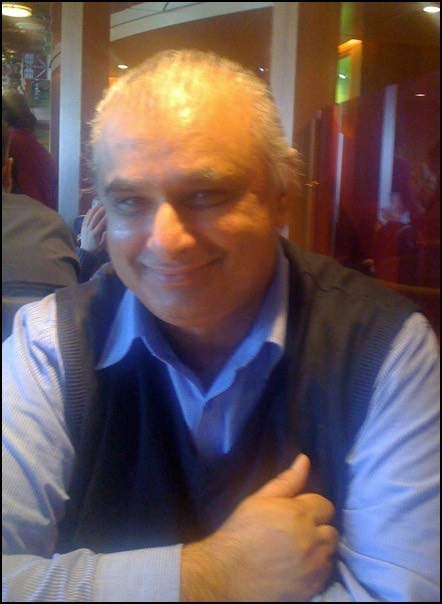
Khalid on the ferry, looking much less stressed than earlier
The story didn’t end at Heathrow. I drove to Bradford, another four hours of driving. The hardest part was navigating through Bradford’s tiny twisting roads at night. Fortunately, traffic was light and I was able to pull over half a dozen times as I neared Vero’s house in order to check my pre-printed route maps and memorize the next steps in the journey. I reached Vero’s house around 10:30 PM, I think. When I knocked on the door I heard her squeal and run to the door; she had been terribly worried about the danger of me driving from Paris to Bradford in one day. We both fell into each other’s arms; it was over.
The whole thing was made possible by the hard work of Kathy and Vero in planning every step of the way. At each point in the process, there was a huge tree of potential paths stretching out in front of us. With their research, we were always able to make the best choice just at the crucial moment. The hardest decision, to spend 960 Euros renting a car at Orly, was easy because we knew that there was no other option; had we not done so, we would surely have spent more money on hotels, food, and wasted time.
This 60-second video really expresses exactly what it felt like navigating that disaster with Kathy and Vero planning ahead for us: Xerox commercial
In the UK: Work days
While I was in England, my time was divided between lecture days and off-work days. I lectured at five universities while in Britian: Brunel, Swansea, Hull, Norwich, and Glasgow Caledionian. Rather than plod through detailed descriptions of each of these, I shall merge all five tales into a single generalized one.
I drove to the city the day before the lecture. It was easy navigating the freeways, but once off the freeway, I had the devil of a time finding my way. I am convinced that the British roads defy the laws of Euclidean geometry: it is entirely possible to set off in a westerly direction and end up miles east of your starting point. The British roads are narrow; if the widest British truck is 7 feet wide, then the widest British road is 14 feet wide and not an inch more. Numerous times I held my breath as a truck roared by with a few inches to spare. It was all very stressful and I always arrived at my destination exhausted.
The next morning I’d set off from the hotel to the university, no mean task, because sometimes parking was difficult to find. Once I was parked, it was usually easy from there, although in Norwich the hike to the university was difficult and I got lost -- quite a remarkable development given my usually unerring sense of direction. Let’s just say that Norwich is a twisty place.
The lectures themselves went fairly well. I was surprised at the small size of the classes; typically only about 30 students attended. The lectures went smoothly but I noted many flaws in the structure of my presentation. The only serious hitch came at a school where they had a ground fault in the power outlet. My laptop was getting power from one outlet, but it was connected to a projector getting power from a different outlet, and there was a voltage difference between the two power outlets, causing current to flow through my laptop. This is a very bad situation; it can easily destroy a computer. Fortunately, my Mac was smart enough to shut down each time the problem became severe. This disrupted the lecture. We were fortunately able to run the lecture from a Mac installed in the classroom. The technician insisted that there was nothing wrong with the power outlets. Right. One of these days they’ll blow up a computer and figure it out.
I’d normally finish around 4:00 or 5:00 and set off for my next destination immediately afterwards; usually I spent about four hours driving after each lecture. All in all it made for long days with little rest. The UK does have rest stops like in America, except that their rest stops are commercial in nature. We have fast food places at many freeway exits; they place the fast food joints at their rest stops.
The primeval forests have long since disappeared, and now the forests in the UK are all managed. Here’s a landscape in Scotland:
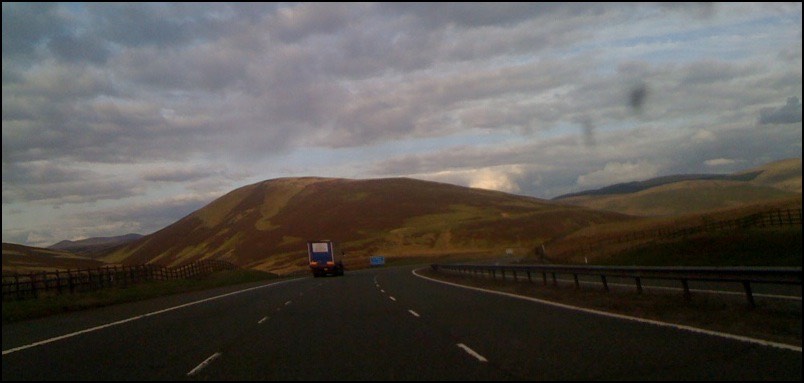
Scottish forest
These hills were once completely forested, but constant cutting of the forest followed by overgrazing killed the trees and left most of the land unusable. So now they plant their forests with geometric precision:
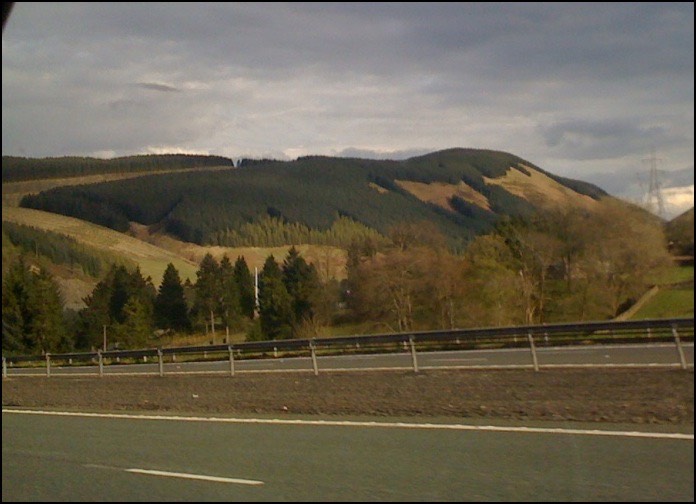
Brave New Forest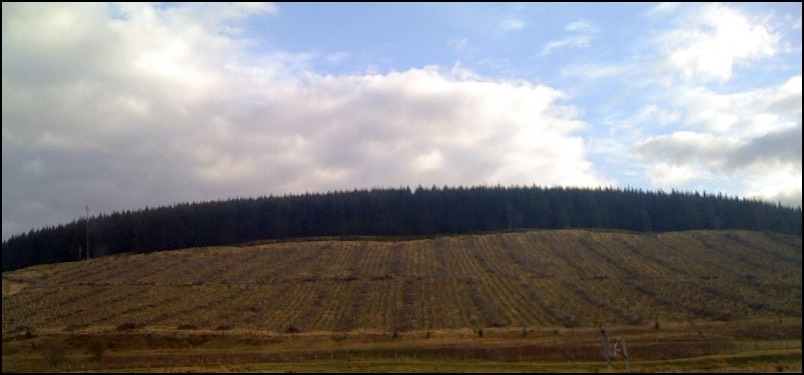
A Harvested Forest
Off-work days
I spent those days with my dear friend Veronique Raingeval. Vero and I have known each other for 20 years now, and our friendship has deepened with the years. Vero is the intuitive yang to my rationalistic yin, and the collision between our two styles has induced much personal growth in me. We have both grown enormously during these last twenty years. I have seen Vero go through boyfriends, jobs, houses, and crises, and she has helped me through my own crises. Here she is early one morning, just getting off a few quick work emails before starting what’s supposed to be a vacation day for her:
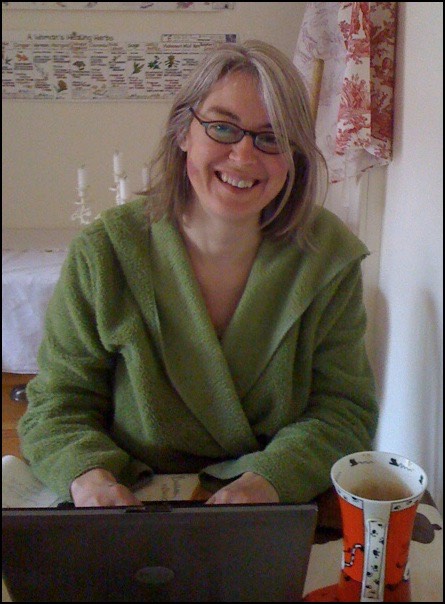
The workaholic
She had carefully prepared a list of exciting activities for me, but I made it clear that I didn’t come to be entertained, but to spend time with her, so we spent our time less frenetically. She took me to a concert by a Sixties female rocker. I was expecting somebody like Joni Mitchell or Judy Collins; instead, this lady (Joan Armitrading, I think) turned out to be more like Jimi Hendrix. Her music was hard and fierce, with impressive guitar work on her part. Her drummer didn’t seem to realize that cymbals are the musical analogue of exclamation points, and so his contribution was to make all her music sound LIKE! IT! WAS! WRITTEN! WITH! ALL! CAPS! Rather heavy-handed, that. Still, some of her songs were good despite the occasional substitution of volume for music. What was most impressive was that a 60+ year old woman could emanate such energy for the entire concert.
Vero also took me to a Turkish bath, something that I would never have done on my own. Everybody wore bathing suits. We started in a steamy room that was quite hot. We sat and talked for about fifteen minutes, sweating, and then took a shower. Next, we moved into a hotter room and again sat talking for fifteen minutes or so, sweating. Another shower followed. Finally, we entered the hottest room, with a temperature of 155ºF. I could handle the heat but my butt was burning from the seat. Vero believes that this is all very good for the health, but I could think only of brain temperature and heat stroke. Fortunately, my sweat mechanism is healthy and I noted no indicators of excess brain temperature. Vero, however, didn’t seem to be sweating; I was worried for her. We left the hot room before she was quite ready. I took one last shower and Vero plunged into the cold pool. A measure of how cold that pool is comes from Vero’s own thermal shock when stepping into it. This is a woman who enjoyed bathing in the Merced River in Yosemite -- meltwater from Sierra snow. That water must have been REALLY cold (cymbals, please).
Vero had paid a contractor to install a steel pole to support her outside clothesline, and the fellow did a really bad job, burying it in less than 50 pounds of concrete in a shallow formation in loose soil. Of course, as soon as any weight was placed on the clothesline, the thing sagged down. I tore it out and re-set it onto the stone wall with braces. I had to fabricate support brackets out of some steel strip that I found. I had to cut it up with a hack saw and bend it with a hammer, but with a lot of elbow grease I was able to get it into approximately the right shape. I had only enough time to install two brackets; I would have preferred to install three brackets but manufacturing each one by hand was a slow business.
Vero made some wonderful meals. I had been wary of her vegetarian cooking, but the dishes she served were mostly very tasty. There was only one dish -- a rhubarb pie -- that I couldn’t swallow. It’s not the kind of food I would have chosen for myself but it was actually pretty good and I widened my gustatory world a bit.
We also worked in her garden allotment. Few British houses have big gardens, so they grow their gardens instead in "allotments" -- spaces about 30 feet wide by 50 feet long. Here’s Vero at work in her allotment:
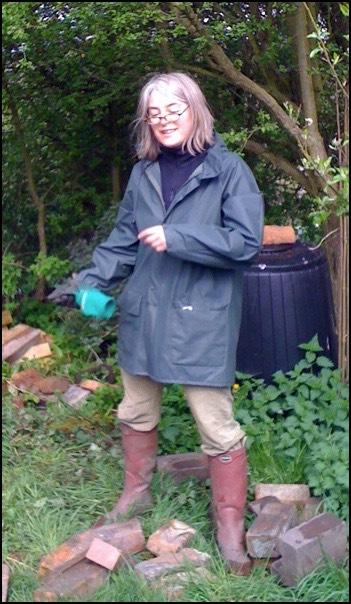
the gardener
We also went for a hike in the Ilkley Moor (I prefer to call it the "Icky Moor"). The British believe that moors are areas of bad soil that cannot support vegetation. I suspect that the truth is that these areas were forested long ago, but have been deforested and then destroyed by overgrazing. They support a little vegetation and a few grouse; that’s all.
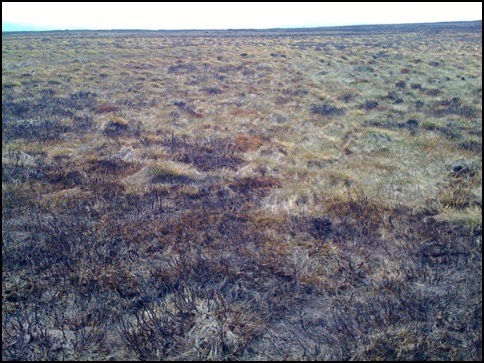
Icky Moor
The ground rock is hard to interpret; it looked to me like a really hard sandstone. But I also found slag on the trails; they must have dumped it from some old smelter nearby.
We also went to a flower show; the British are big on their gardens and love flower shows. The vendors there were doing a brisk business selling all manner of garden paraphernalia. Vero bought as much stuff as the two of us could carry.
The English have a penchant for cute little roads; here’s Nog Lane on the way from Vero’s house to her allotment:
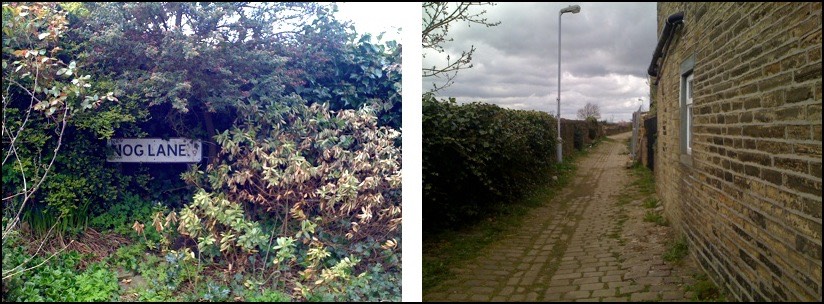
Nog Lane
On our last day together we went out to a nice lunch, after which I bought, at Vero’s suggestion, a beautiful ceramic knife for Kathy.
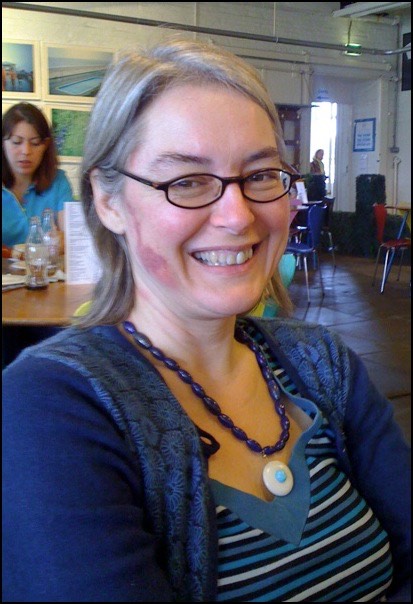
Vero doesn’t like photos from this side because she thinks that it’s not her good side. But her smile is just a joyous from any angle.
After lunch I took Vero back to her house for the last time. We hugged goodbye. She stood in the street in the pouring rain watching me drive away. When I turned the corner two blocks away she was still standing there waving goodbye.
The next day I got on an airplane and went home.
